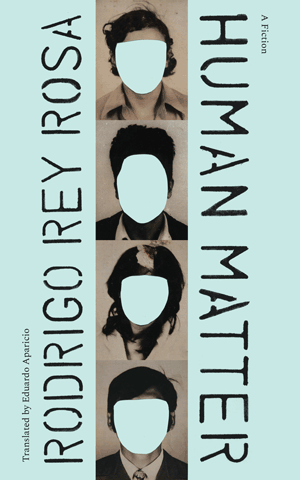An explosion in an army depot storing weapons leftover from a brutal civil war unearths a vast archive of secret police documents, whose discovery threatens to tear the scab off a fragile peace and pits the archive’s researchers against each other.
That might be the elevator pitch for Rodrigo Rey Rosa’s Human Matter, if the book were the high-concept novel it practically begs to be. Instead, Rey Rosa uses this real-life event — which occurred in Guatemala City in 2005 — to explore not only the dangers of exposing secrets, but more meta matters regarding the possibilities and responsibilities of a writer like himself in doing so.

Rodrigo Rey Rosa was born into an urban, upper-middle-class Guatemalan family, and spent most of the Guatemalan Civil War years (1960-1996) abroad, hanging out with other writers and expatriates and eventually becoming Paul Bowles’ protégé and literary executor. The narrator of Human Matter is one Rodrigo Rey Rosa, a self-described dilettante who spends a lot of time traveling abroad, dreaming about Paul Bowles and wondering what angle to take in writing about the war. This is autofiction, a genre more often associated with bedridden French writers with a taste for madeleines and Norwegian ones who struggle to fry an egg rather than with the literally explosive events in Human Matter. (Implosive, too, given that soon after the archive’s discovery, an enormous sinkhole threatened to swallow it.) As autofiction, it’s more concerned with the conditions under which Rey Rosa might create the novel than in directly dramatizing the events surrounding it.
Rey Rosa’s interest in what is now officially the Historical Archive of the National Police is initially in finding dossiers the police might have kept on his fellow Guatemalan writers. But when he realizes how much work would be involved — the archive then contained 8 linear kilometers of uncatalogued documents — he opts, in true dilettante fashion, “to frequent the Archive as a kind of entertainment, and as I usually do when I have nothing to write, nothing really to say, during those days I filled a series of notebooks … with simple impressions and observations.” (Thanks to the Rapoport Center for Human Rights and Justice and the University of Texas’ Institute for Latin American Studies, much of the archive is now online.)
These simple observations reveal the scope and arbitrariness of police actions in an authoritarian regime: Aguilar Elías booked for “allegedly claiming communist sympathies”; Luis Alfredo Barrientos, journalist, booked for “spreading outlandish ideas”; Leopoldo Cabrera, classical musician, booked “without a motive”; Mario Godoy, student, arrested for “impertinence”; Dolores Novalis booked “because she wants to leave prostitution and lead an honest life”; and so on.
The rest of the book consists of diary entries in which Rey Rosa records the ups and downs of his research and describes some of the personalities involved. One of the most interesting is Benedicto Tun, a K’iche’ Maya man who was the Policía Nacional’s preeminent forensic specialist for 50 years. Rey Rosa tracks down Tun’s son to try to get a handle on what kind of man would participate for so long in such a barbarous institution, and gets no clear answer — though he does point out that Tun was fortunate to secure a high-ranking position at a time when even future Nobel laureate Miguel Ángel Asturias was writing, “Let us do with the Indian as with other animal species, such as cattle, when they present symptoms of degeneration.”
In the course of the Guatemalan Civil War, the state military wiped out entire indigenous communities. Finally, in 2013, thanks in part to evidence from the archive, dictator General Efraín Ríos Montt, whom Ronald Reagan called “a man of great personal integrity and commitment,” was convicted of genocide for trying to exterminate the Ixil Maya. Rey Rosa uses figures from a United Nations-sponsored truth commission to remind us that of the 200,000 killed and disappeared in the war, 83 percent were Maya. The vast majority of the casualties, 95 percent, were attributable to the state and its allies, with rebel groups responsible for only 5 percent.
Another principal character is the archive’s overseer, known only as “the chief.” He is modeled after Gustavo Meoño Brenner, the archive’s original director, who was fired last year from the post by Guatemala’s increasingly autocratic president Jimmy Morales. The chief blows hot and cold on Rey Rosa’s presence, alternately pleased with the famous writer’s interest and suspicious of his motives. The chief grew up in a Guerrilla Army of the Poor (EGP) “hive,” as the communal refuges for the children and relatives of that armed leftist faction were called; Rey Rosa’s mother, in real life as in the fiction, was kidnapped and held for six months by a short-lived urban guerrilla outfit that might have had links to the EGP.
A traditional work of fiction might demand that this conflict be brought to a dramatic climax, but we’re instead thrown back into Rey Rosa’s actual life. There, his mother expresses no interest in pursuing the matter of her kidnapping, his father says his son is “touching gunpowder” with the whole archival research thing, and Rodrigo decides it’s time for another trip to Paris, where he has dinner with literati, gets money from his mother to visit his sister in Italy and has dreams in which a fellow archive researcher appears as one of her kidnappers. When he tells Paul and Jane Bowles’ French translator about his research, she tells him it has all the “elements of a thriller.”
Human Matter is no conventional thriller — Rey Rosa doesn’t stop sharpening the self-referential, autofictional knife long enough to cut that kind of drama. The drama, rather, subsists in the writer’s internal struggle to come to terms with the hideous history of a country he has always had the privilege to escape, but which is nevertheless his own.







